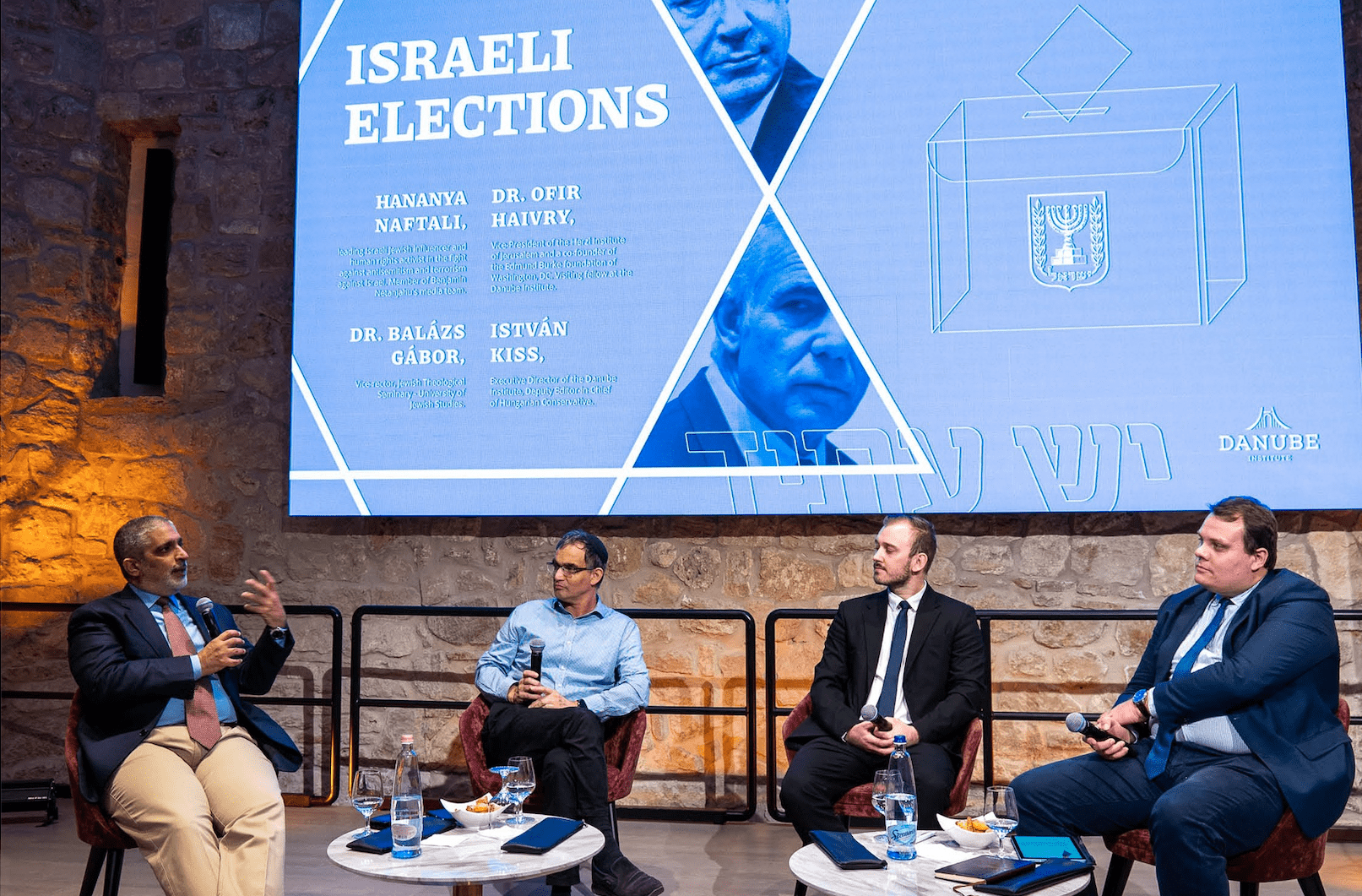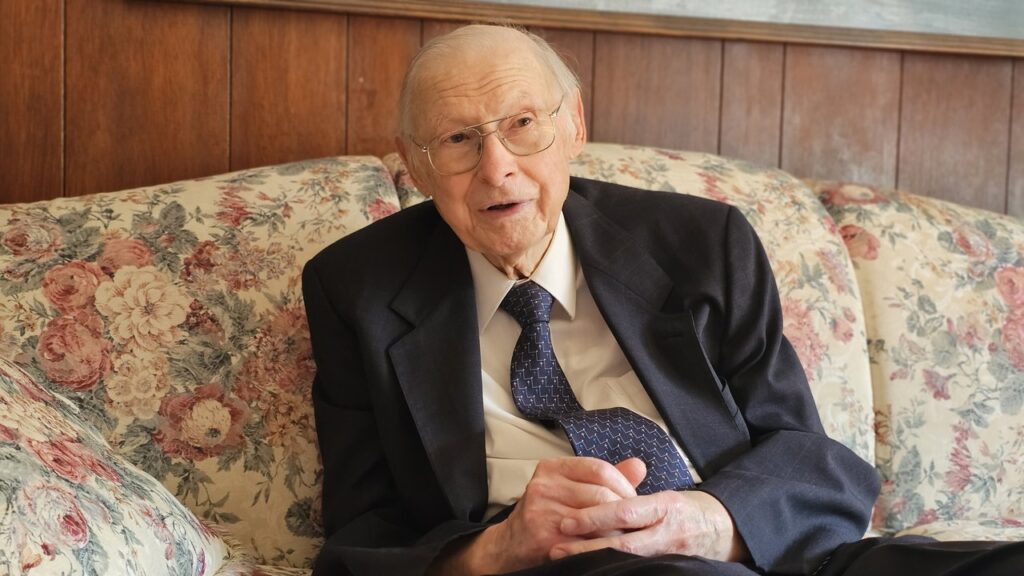On 1 November for the fifth time in four years, Israeli citizens went to the polls after the government led by Naftali Bennett lost its governing majority overnight, further deepening the political stalemate that has persisted since 2019. Election results suggest that veteran politician and former premier Benjamin Netanyahu could return as prime minister after his coalition managed to win enough seats to form a religious-right wing government. What will a ‘new’ Netanyahu era look like? What challenges will the prime minister face? What are the differences and similarities between Orbán and Netanyahu? These were some of the questions that experts invited to a Danube Institute discussion answered on 8 November.
The panellists of the conference were Dr Ofir Haivry, Vice-President of the Herzl Institute of Jerusalem and a co-founder of the Edmund Burke foundation of Washington D.C.; Dr Balázs Gábor, Vice-rector, Jewish Theological Seminary – University of Jewish Studies; and Hananya Naftali, leading Israeli Jewish influencer and human rights activist in the fight against antisemitism and terrorism.
The conference started with Hananya Naftali’s remarks, who told the story of how he became a member of Netanyahu’s communication team and the Prime Minister’s social media manager in 2018. After finishing his military service in 2014, Mr Naftali decided to go into social media to defend conservative values and debunk the lies spread about the Jewish state. His social media activity grew rapidly, and he quickly gained hundreds of thousands of followers, which caught Netanyahu’s attention and invited the young activist to join his team.
Mr Naftali illustrated the double standard and hypocrisy of today’s liberal media with several examples, and he also touched upon the destructive nature of fake news and misinformation about countries such as Hungary. Naftali argued, based on his own experience, that
today Hungary is one of the safest countries in the world for Jews thanks to Viktor Orbán’s administration
and the laws the government has passed to protect Jewish communities and combat anti-Semitism. He said that Netanyahu and Orbán are both leaders who believe they know what is good for their country and who care not about saying the right thing but doing the right thing for the sake of their nations. Hananya Naftali concluded his presentation by stressing that Israel sees Hungary not just as a partner, but as family.
After Mr Naftali’s opening remarks, Danube Institute Director István Kiss turned to the panellists to ask them to assess the results of the elections and the expected policies of the next Netanyahu government.
Dr Ofir Haivry highlighted that as they gained 64 mandates, there is no question of the legitimacy of the Netanyahu-led religious-right wing bloc. Although, He added that although the election results show a relatively small victory for the right in terms of numbers, they do not reflect the actual support for right-wing ideas in Israel, because overall, around two-thirds of the Israeli population leans more toward the right. The explanation for that is that Israel became very polarized around Prime Minister Benjamin Netanyahu, so basically, the electorates are not divided so much along right-wing or left-wing policies but along the support or rejection of Mr Netanyahu.
Hananya Naftali pointed out that the anti-Netanyahu bloc was defeated also because the main message of its election campaign and political agenda was that they are not Netanyahu, and that they would never enter a coalition government with him. This message, however, proved to be insufficient, while Netanyahu worked harder to unite the right to be able to lead the country. The influencer highlighted that voters in Israel should not vote based on personal sympathy or hate but focus on the results of politicians. In that sense, Netanyahu’s track record has many factual results including the peace agreements between Israel and Morocco, Sudan, Bahrein, and the UAE.
‘All I’m asking is that people look at results, and then decide who they want to vote for. I’m not against the right or the left, but rather want to see all of us united, because we have common enemies wanting to destroy Israel,’ Mr Naftali said.
Asked about the stability of the next Netanyahu government and its ability to complete its term, Dr Gábor Balázs said that
Netanyahu is in a difficult position within his coalition government.
Although he himself is a secular Jew, he will be surrounded by right-wing extremists since the Religious Zionism party overperformed in the election, gaining bigger influence in the coalition, and is expected to reshape government decisions going against Netanyahu’s will. In that regard, it is going to be quite challenging for Netanyahu to navigate the space between these parties.
‘Now, Netanyahu got something that he doesn’t like,’ Mr Haivry added, namely a full-blown right-wing government with coalition partners who are more radical than he is. In fact, Netanyahu currently represents the most moderate wing of his right-wing coalition government. But this apparently goes against Netanyahu’s nature. ‘There are even rumours that there were attempts to include one of the centre-left parties in the coalition, but I don’t believe that it would ever work. They have no interest in doing that,’ Mr Haivry opined.
After the elections, the strengthening of the Religious Zionism party, gaining 14 seats, received mass media coverage. Both the party and its leaders Bezalel Smotrich and Itamar Ben Gvir were quickly labelled far right and radical in the media. Mr Kiss wondered what the key factors that contributed to the rise of Religious Zionism were and whether the party could be called far-right.
Mr Haivry pointed out that the rise of the far right was partly due to the disintegration of former Prime Minister Naftali Benett’s Yamina’s party, which created a vacuum on the right. This was well exploited by Religious Zionism. Their flagship policies are more settlements in Judea and Samaria; increasing the presence of Jews and Israelis on the Temple Mount, and far tougher policies towards the Israeli Arabs in areas where there has been a kind of breakdown of the law and order in recent years. In theory, all three of these policies are also shared by Likud. But during its ten years in power, Likud never implemented them. This was recognised by Ben Gvir and Smotrich when they promised to push these policies forward.
Dr Balázs Gábor mentioned some of the concerning facts because of which especially Ben Gvir could be considered a far-right extremist. One, for his overt anti-Arab sentiments or having been a member of the ultranationalist Kach party, which was banned from the Israeli Parliament because of its racist views in 1994.
‘Well, to those of you who are not familiar with Ben Gvir, he’s the one that keeps the New York Times and CNN journalists awake at night,’
Hananya Naftali jokingly remarked. Mr Naftali said that while he is also aware of the anti-Arab sentiments Ben Gvir and his circle have voiced, he personally leans towards believing that the provocative comments were made to rise to power, and then to be able to execute far more moderate policies.
Mr Naftali also responded to a question about the concerns of the Western media that the far-right’s entry into government and its actions will hinder the Israeli-Palestinian peace process. ‘You know, my take is that ever since we started building homes in our ancestral homeland, where most of the biblical events took place, perhaps, only perhaps…terrorists have been the obstacle to peace.’
Mr Kiss introduced his last question by recalling a BBC article he came across after the Israeli election took place which stated that Israel was on its way to becoming like Orbán’s Hungary, recently branded as an electoral autocracy by the European Union. He reminded that both Netanyahu and Orbán are seen by some of the progressive media as people who are destroying democracy, and asked the panellists to comment on those characterizations, and also to share their thoughts on the similarities and differences between Netanyahu and Orbán.
Balázs Gábor noted that it was very interesting to read about the ‘bromance’ between Netanyahu and Orbán in several articles published after the elections. The professor said in his view the chief similarity is that both of them are very charismatic while also very divisive leaders: people either hate them or love them. In addition, both are going against the mainstream in Europe and more broadly, in the Western world and are not bothered by the public opinion about them. The professor also remarked on the similarities in the political atmosphere in which the two politicians operate and in their recent election campaigns.
Ofir Haivry highlighted that while there are certainly some similarities, there are also big differences between the two leaders.
‘One is that Netanyahu likes to govern from the middle, and he has not merged the Israeli right into one large party as it happened in Hungary. I’d say that they have a lot of similarities in their foreign policy, and in their general outlook, but although their values are similar in some senses, their actual policies inside their respective countries I think are very different,’ Mr Haivry concluded.
Mr Naftali, on the other hand, highlighted the commonalities between the two statesmen. ‘I think that both Orbán and Netanyahu are the perfect leaders for this given time,’ he declared. ‘I would say that what drives them is the belief that they know what is right for their countries, and the passion to execute what is good for the country. And I think that both Orbán and Netanyahu focus on the real issues. That’s how we perceive Mr Orbán in Israel: that whatever the mainstream media says about him, he will protect his country’s borders. And yes, maybe it will upset the media, but he doesn’t care, because he thinks that this is what is good for the people, the nation and the country.’








